Denys Herasymov
Shall we introduce you to the CF “B50 VOLUNTEERS” director, Denys Herasymov?
Because this modest guy in a green panama hat (or green cap), although he loves the role of an ordinary volunteer and working with his hands, knows how to take initiative in time and dream big for the bus. By his example, he shows that even “dirty work” on manhole covers in Borodianka can be fun.
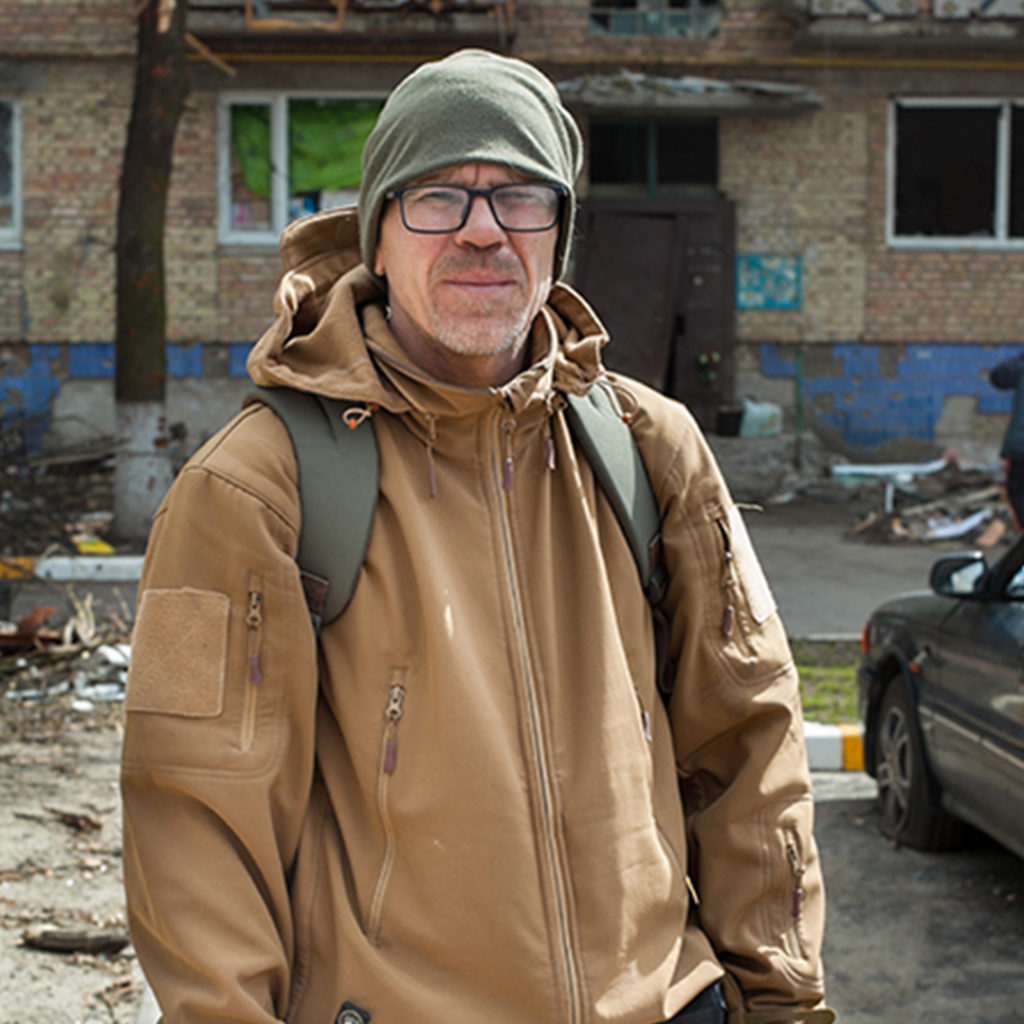
In the interview, Denys told us:
- how to get a cool profession after dropping out of university;
- when he came up with the idea to start a charitable organization;
- why he became the head of the CF “B50 VOLUNTEERS” and what it’s like to be its leader;
- what to expect from the community in the future.
| Name | Herasymov Denys Valeriyovych |
| City | He was born in Vorkuta (russia), moved to Kyiv at the age of 18 (thanks to his guardian brother, who fell in love with a Ukrainian woman) |
| Age | 46 years old, birthday – March 16 |
| Profession | CF “B50 VOLUNTEERS” director, and besides that, a UI/UX and graphic designer, who grew to become a manager in the company that manages the FILM.UA complex |
| Hobbies | “Treasure hunt” with a metal detector (together with his wife), among the artifacts found are coins, fragments of Scythian jewelry |
| Sea or mountains? | He loves the sea but does not consider himself an experienced traveler |
| Childhood sport | Judo and aikido (just a little bit) |
| Favorite food | Likes to eat everything and wants to try bohrach |
– Denys, where were you on February 24? How did you find out that russia’s large-scale invasion of Ukraine had begun?
– I was in Kyiv, in Troieshchyna, with my family. We learned about it from the news. There is a phrase: “If there is a potential possibility that the enemy will attack, he will definitely attack.” I knew it could happen, so I was calm. But at first I was confused. We followed the recommendations and started packing our bags.
And when cars burned down in the neighboring yard, something exploded, smashed the glass (I think it was a sabotage and reconnaissance group), then we started looking for shelters. We have a condominium building managed by a friend of mine, and we arranged places in the basement to stay overnight. But we got tired quickly.
On the 26th, I went to the headquarters of the Territorial Defense. There was a queue of about 4-5 thousand people, and it was moving very slowly. Those who were not accepted came back the next day. Later, the military asked us to divide into neighborhoods, and the running began. The next day, they asked to divide us into hundreds, and everyone was running around preparing documents and contracts (by the way, I still have the unsigned one). The next day, they asked for twenties, and then for twelve. And so, when I was waiting for someone to take me to the hundred, everyone was standing and waiting the same way. So I joined in: let me divide you, let me be your senior. We ended up 43rd in the twelfth!
We thought that we would be given weapons, that we would stand near the house and shoot back, make Molotov cocktails, traps and so on. But there were no weapons, nothing was happening.
Later, the leadership of the Territorial Defense headquarters was bothered by questions like “Why are we sitting here?”, “Why aren’t we called?”, “What should we do?”, “When will we be given weapons?” They explained that the Territorial Defense reserve had no special legal status and suggested that we contact the volunteer battalions, help people on the ground, prepare firing points, and so on.
Sometime on the same day, my wife packed up our things, packed up the kid, and we went to Lviv. There we said goodbye to them: they went to the Czech Republic for a month, and I returned to Kyiv and thought about what to do.

– As far as I understand, you chose to help people. How did you get into the B50 community?
– I don’t remember exactly how, but Sasha Kramarenko, one of the initiators of B50, appeared from somewhere. He started training reservists and Territorial Defense. He organized instructions on assembling/disassembling the machine gun, tactical and medical training. I saw that they were gathering a team of volunteers for Irpin. At that time, there were 500 people from all over Kyiv cleaning up! At that time, I thought we would only travel, help, and clean up.
The idea to create an organization came after the first trips to clear the rubble with other groups. We began to gather in the mornings on Bratyslavska Street because most of those who went were from Troieshchyna, Lisovyi Masyv, and Darnytsia, and it was more convenient to find drivers nearby. Then we started talking about what else we could do. We thought that there was a training project and a cleaning project and that they could be combined. Why? To develop the movement itself. Because you can search for finances and materials privately. But when you have an organization, there is more recognition, trust, transparency, and you can check the activities.
Sasha was the first, Adel was the second, and I was the third. There was also Ilya, who participated in the organizational processes.
– How did it end up that you were the third to become the head of the charitable organization?
– It took us a long time to figure out who would be the director. Sasha said that he wouldn’t have time, that he wouldn’t be able to do it. I said: “What’s there to pull! We’re not reinventing the wheel!” I offered myself, everyone agreed, and now I think: “That’s a lot to pull!”. Just when you think you’ve got it all figured out, it gets even harder, especially now, during martial law.
The main thing is that there is transparency in my work. I have nothing to hide, so it’s easy for me. And these difficulties with papers and formalities are all solvable. The most important thing is that no one has any dissatisfaction. It is difficult, but we have to listen to everyone!
I designed the “B50 Volunteers” logo myself. I had it in my head, created it, brought it, and we discussed it.
– Do you know a lot about design?
– Yes, this is my specialty! Good people told me that I should study computer graphics, because it was promising. I started learning graphic editors on my own. I studied, tried, made mistakes, stopped, changed the editor, and saw if it suited me. I only have a secondary education. I studied at the KPI (Kyiv Polytechnic Institute-ed.), just one year. But I was such a “bummer” that I was expelled and joined the army.
I met my first employer at a party. He offered me a job at the IAS “Podrobnosti” of the Inter TV channel. That was the website of “Podrobnosti”, if you remember. I used to sit there and make banners for news articles. I drew these “tempting” gifs. This job was right for me then, because it was experience and seniority.
When my boss was leaving Inter, in 2006, I think, he invited me to go with him. I agreed. The company itself has changed over the years, but I stayed on to design websites. About three years ago, it closed, and I moved to the company where I work now.
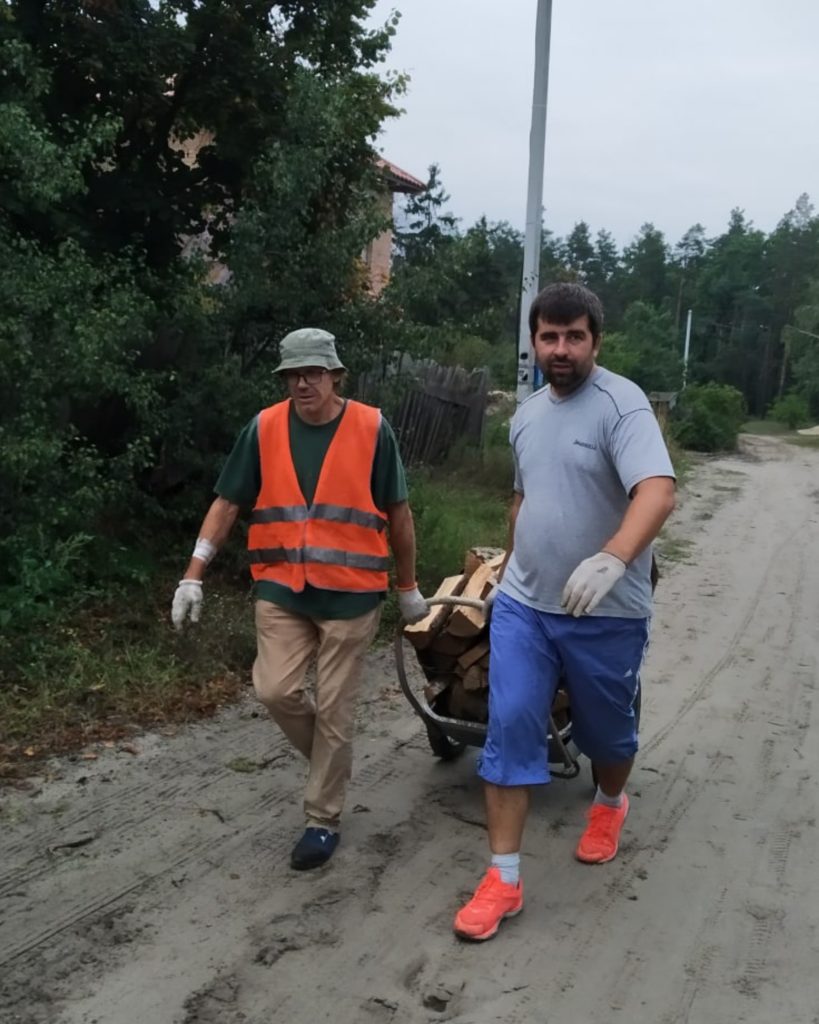
– What projects are you working on alongside managing B50 Volunteers?
– Our company owns the territory of the FILM.UA film studio. It supports and maintains the studio complex itself: security, heating, electricity, service, and so on for the film business and tenants.
Here I was a graphic designer, and now I am a manager according to the labor book. Because graphic design is part of a broader field of activity. I like to create complex systems.
One of the last tasks was to create a new access system for FILM.UA. We had to make the whole thing based on the existing program: create badges, distribution by company, by time, car access, issuance of material assets, and a complex time tracking system.
It’s good that I had this opportunity. Because I didn’t even know I was interested in it. I thought I would draw banners, websites, create an interface, draw how a user should use the site. And then I realized that I was interested in, for example, working in Archi (a program that shows business processes of complex enterprises).
– The B50 Volunteers community also has a fairly extensive system. What are the directions of the foundation? Tell us, because not all newcomers know…
– “B50” now has three programms.
The first one is the actual work: in Moshchun, Horenka, Irpin, Makariv… I call it B50 Restoration. For me, this is what I can do. I can dig and I will dig. I can disassemble and I will disassemble. I find it very useful to do “hard” work sometimes. Because it cleanses, no matter how pathetic it may sound. When you come home, you no longer have any unnecessary worries in your head, worrying about whether the missile attack will happen. You just rest with a sense of satisfaction that you have not spent the day in vain.
There is also B50 Training, which Sasha Kramarenko is responsible for.
And B50 Production, where we make camouflage nets, trench candles, and anything else that can be produced if it benefits the army and helps those who ask for help.
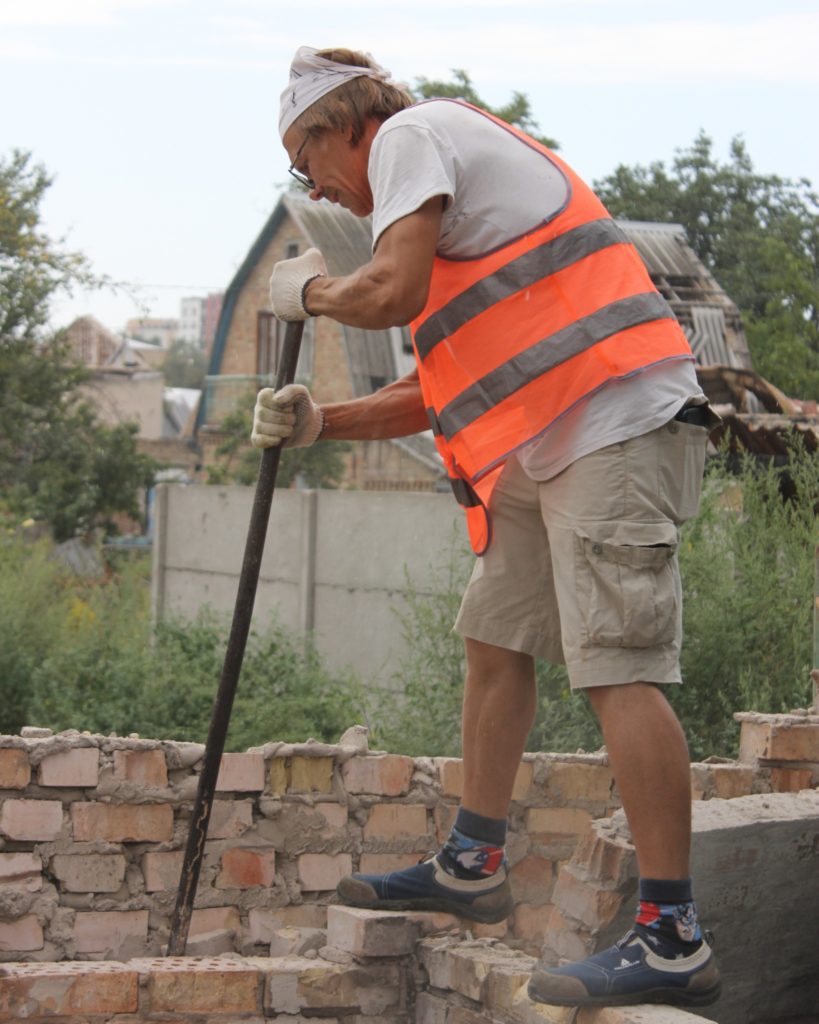
– You are at the head of such an organization, but at the same time you can easily “sink” to the role of an ordinary volunteer. I assume that some activists do not even recognize the person with whom they repair the roof in Moshchun as a community leader…
– I don’t rise to the role of a leader. I don’t feel that I have any strong leadership skills. I have an understanding that if no one is doing anything, then I have to do something myself! And when I arrive, I try to be somewhere inside. Come on, get organized! Don’t you know what to do? Here is the owner, here are the shovels, here are the cars…
– What inspires you most about volunteering?
– I like any area that I understand that I will do well! I like digging trenches. By the way, I learned to dig even earlier. My wife and I have a hobby of traveling with metal detectors to look for treasures. We traveled around the Kyiv region, where our Daewoo Matiz allows us to go. When we were vacationing in Kaniv, we went hiking near Prokhorivka. We didn’t manage to do much because it lasted for a year or a year and a half. But we found coins, fragments of Scythian jewelry… We also liked clearing manholes in Borodіanka. Human sincerity is very inspiring.
– For new activists, I’ll explain that in April and May 2022, B50 worked in Borodіanka. One of the tasks was to help the local water utility clean sewer manholes. How was your work there? What interesting things did you find?
– Oh, it’s a dirty job!!! But I want to show by my actions that there is no need to be afraid of it. Sometimes some people say: “This is not why I came here, this is not because of the war, this has not been cleaned up since the Soviet era.” But we are here now, at this manhole, and there are destroyed houses around, and most importantly, you are asked to do this job! And just because the work does not involve combat operations and their consequences, it does not mean that it should not be done.
Moreover, we clean these manholes not just for the sake of cleaning them, but to supply water to modular houses for people who have lost their homes. Everything is interconnected!
The manhole looks like an ordinary well from the inside: it’s not very deep, and there’s a big piece of pipe and a tap. You can’t work in the manhole alone: there must be one person at the top and one at the bottom.
Some manholes were crushed by machinery, and everything was poured in – asphalt, bricks, concrete, sand. And some of them just get clogged with different garbage from the streets over time, because of the rain. There were manholes from which water was pumped out – and you stood in the mud. What do you do? You take a bucket with a rope and a small shovel and sit there, pouring. Once I found a hockey puck. I was so surprised at what it was doing there!
The B50 volunteers cleaned all the manholes on the main street that goes to the modular houses and on the adjacent ones. All those that are related to the water utility.
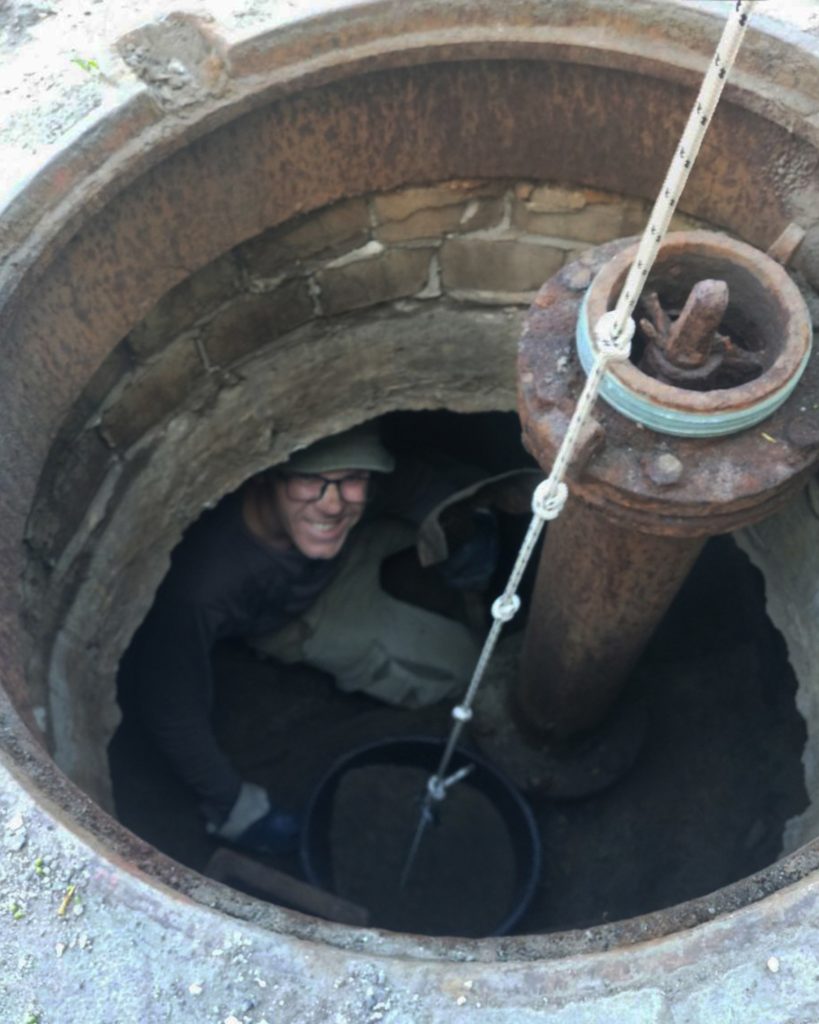
– What would you say to new volunteers who are joining the community?
– Dear volunteers, be careful and cautious! Always and everywhere. Both in your personal life and, most importantly, when you go to places where there have been hostilities or that have been under occupation. You should always leave 1% that may not be demined somewhere.
If it’s winter, the intensity of our trips will decrease significantly, if not stop by spring. At this time, we need to work on ourselves and get ready. Because this is a long story!
– So, according to your forecasts, the war will drag on?
– No, I’m talking about the goal of our activities – to eliminate the consequences of the russian invasion! To get rid of this scar as soon as possible… I realize that you can’t get rid of it completely. But I want children to go outside and not see these holes, these broken fences, and so on.
– How do you see the future of Ukraine? When will the war end?
– Our people are wonderful! They opened up when it started on the 24th. Irreversible processes have already taken place! So we will definitely restore everything! In 2 years, I think I’ll be sitting somewhere in Mariupol, digging up some ruins, or even building something.
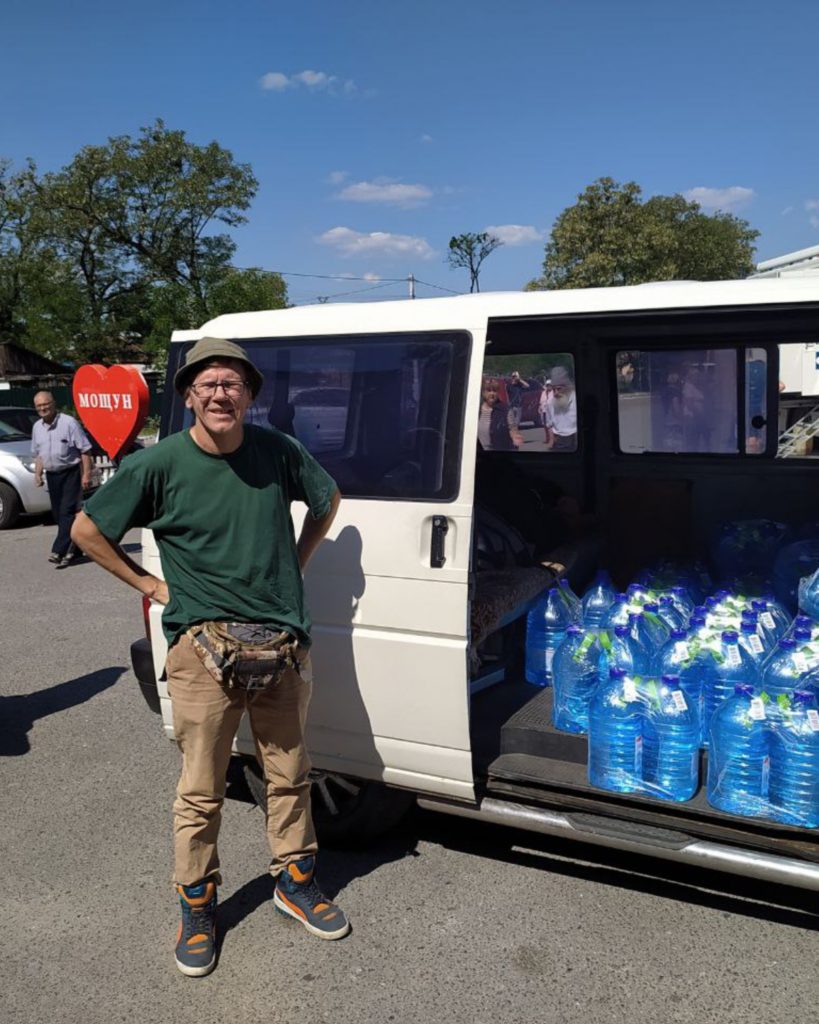
The interview team:
- Interviewer – Nataliia Hryniuk
- Editor – Kateryna Lehka
- Translator – Anastasiia Lypchak


